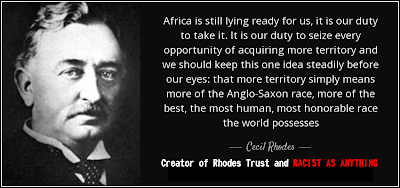04 May 2018
Rhodes Trust is academia’s equivalent to Confederate statues and flags
In the last few years in the United States, there’s been debate about the presence of Confederate flags and statues in public places. I credit Bree Newsome for getting this ball rolling. The Confederacy was built on the notion that slavery was right and just.
Continuing to display the symbols of that failed government on public grounds is tacit endorsement of the ideals of white supremacy. Put those statues and flags that are on government property in museums.
This morning, I was given a link to a fellowship and was asked to promote it. I had two problems with that, and the first was that the fellowship had a lot of ties to the Rhodes Trust.
As a student, I learned about Cecil Rhodes because of his association with Oxford’s Rhodes Scholarships (supported by the Rhodes Trust). That name had a positive association for me.
It was only later that I learned, “Man, this dude was racist as fuck.” In Born a Crime, Trevor Noah says if many Africans had a time machine, they wouldn’t go back in time to stop Adolf Hitler, they’d be packing heat for Cecil Rhodes. (Edit: Yes, this is admittedly a big gap in my education. I should have known.)
I wish I had learned about Rhodes’s colonial racism first, not years after hearing about the scholarships. The misery Rhodes caused in life seems more important to me than the money he left behind after death.
The second problem I had with this fellowship was that it was for “leading academic institutions.” I’m pretty sure that means American Ivy League institutions and English Oxbridge universities, and not the sort of public, regional institutions where most students in the world get their university educations. (The sort of place I work.)
Racist and elitist was not a winning combination for me. I did not push out notification of the fellowship. Admittedly, this was made easier because the deadline was past, but I wouldn’t have done it regardless.
Is Rhodes the only example? When I mentioned this on Twitter, “Sackler” came up. Like Rhodes, I first heard that name in a positive light: the Sackler symposium on science communication, which I’ve blogged about several times (here in 2012, here in 2013). But the Sackler family is problematic: they made a lot of money from opioids, which is now a major public health problem. And that name is on museums and medical schools.
Like Rhodes, I should have known about the Sackler drug connection before I knew about the symposium. That’s not good.
Turning money isn’t as easy as taking down a flag on a pole, or a statue in a park. But the principle is the same. Academia needs to look harder at how to stop giving these unspoken endorsements to people who caused a lot of suffering.
Update, 14 May 2018: Poll results from Twitter. 88% of people surveyed said they’d take money with the Rhodes name.
Picture from here.
Subscribe to:
Post Comments (Atom)




No comments:
Post a Comment